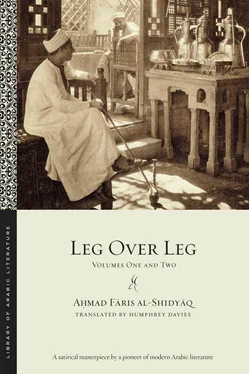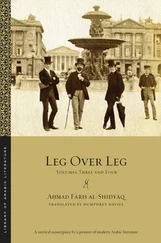
2.16.1
The pen has refused to obey my command to leave this stimulating spot and talk of the Fāriyāq and his like, and he too indeed, in all likelihood, would rather stay put than talk about himself. Thus there is no help for it but to resume my description of women, without tendering him any apology.
2.16.2
I thus declare: certain of our most eminent scholars have said that the woman is more honorable than the man, more imposing, nobler, more clement, more virtuous, and more generous. The argument for her being more honorable rests on the fact that the two witnesses to her feminity stand in an elevated position, enabling her to see them and to make them seen whenever she wishes, without bowing her head or bending over, and in this lie a pride and a nobility that cannot be concealed. Are you not aware that a certain litterateur has claimed that “the pride of ‘No’ lies in one’s saying it with one’s head raised, while the humiliation of ‘Yes’ lies in saying it with it bowed?” The two witnesses to a man’s masculinity, on the other hand, are withdrawn, in a position that allows him to see them only if he bends over and bows down.
2.16.3
The argument for her being more imposing lies in the fact that her legs, which are the columns upon which the mass of the body stands, her belly, which is the nest in which the soul is formed, and her backside, which is a source of paralyzing inaction, are more imposing than the legs, belly, and backside of the man. The argument for her being nobler lies in the fact that she is treated with the respect due to nobility for a period of nine months because of what is cast into her. The argument for her being more clement lies in the fact that the mark of clemency 619is visible on the two witnesses to her femininity.
2.16.4
The argument for her being more virtuous lies in the fact that she was created from and subsequent to the man and that he was created from dust. She, on the other hand, were she to die (which God forbid), would turn to dust like the man, not to the origin from which she was taken, i.e., would not become either a man or a rib. The argument for her being more generous lies in the fact that she is more tender-hearted, more kindly-minded, and more gentle-natured. If she sees someone to be in need of something she has, she will not begrudge it to him, on which topic it is enough to cite what the eulogist had to say about Mistress Zubaydah when he wrote,
O Zubaydah, Jaʿfar’s daughter,
Happy the visitor you reward!
You grant as many wishes with your feet
As your hands accord.
When her attendants reproached him for these words and rose to beat him, she scolded them and thanked him, for she knew that his description was not wrong. 620
2.16.5
Another eminent scholar has stated that a woman generally lives longer than a man, because her inborn suppleness, childlikeness, and smoothness allow her to face events with patience and deliberateness so that she is flexible with them, meaning that she bends now to this side, now to the other, being in this like the supple branch that bends with the wind and does not snap. Man, on the other hand, given his innate hardness and dryness, holds himself rigid and unyielding in the face of whatever may befall him and is, as a consequence, quickly destroyed by it, being in this like the dry tree in the face of the tempest. Another of her singular charactestics is that alcohol does not affect her as much as it does the man, and people differ over why this is so. Some believe that there is an attractive force in the woman’s blood that overcomes the alcohol and draws it downward so that it doesn’t ascend to her brain. Others claim that the woman herself contains a kind of alcohol called ruḍāb 621that is so strong within her that if you mix it with any other drink whatsoever the latter loses its strength; a single drop of this type of alcohol is sold sometimes for an enormous sum of money and sometimes for a man’s head or his neck.
2.16.6
Further peculiarities of hers are that her locks are longer than a man’s, her lyrics more eloquent, and her likes more precise, and that sleeping with her inside her slip is more fortifying. As to the first, no two will disagree. As to the second, the reason is that, when she makes up verses, she always composes them about a man and as a result it both pleases and affects men through nature, while simultaneously pleasing women through both nature and art. (This may be another of the knotty issues relating to women, for it seems to me that this analysis applies to the man only, for the only thing he composes verse about is women. This may be answered by saying that most of the output of the brilliant poet is directed to activities other than the love lyric, such as dreaming up praises with which to tell lies about some emir or describing a party or a war or something of the sort.)
2.16.7
The third argument may be illustrated by the fact that, if she passes a cloth merchant’s store, for example, and catches sight of some translucent, citron-colored fabric, the moment she notices it she’ll tell you that it would be perfect for the evening, while your thoughts at the time may be elsewhere — on a book to read or on buying a donkey to ride. If she sees some green silk brocade she’ll tell you in the most matter-of-fact way that it would be perfect for winter or, if some extra-fine white linen, she’ll assign it to summer. Similarly, if she passes a jeweler’s store, or you’re besotted enough to take her to one, she’ll tell you immediately that that diamond would make a perfect bezel for a signet ring on her little finger, that ruby for one on her fourth finger, that emerald for one on her middle finger, that turquoise for one on her index finger, and that perfect pearl for one on her thumb; that those large pearls would make a collar for her neck, these little ones a bracelet, and those gem-studded gold chains could be placed around her neck next to the necklace so as to hang down to her waist, with a gold watch suspended from them, while those heavy earrings are for the winter, those light ones for the summer, and those medium ones for the spring and fall — during which time your thoughts are still preoccupied with the donkey. If it be objected that the second-person pronoun attached to the word “thoughts” is addressed indiscriminately to all readers and that your book may experience the honor of being read by an emir or other mighty lord, in which case it would be inappropriate to address him in this way, for an emir doesn’t think about donkeys, I declare, in Chapter 36 of the Book of Genesis, it says that Anah, descendant of the son of Seir the Horite, used to graze the asses of his father Zibeon, and he was an emir; in fact, in some copies the title “duke” is appended to his name, and a duke is higher than an emir. 622
2.16.8
Next, she — that is the woman — while contemplating these jewels, will lose no time in dividing the entire population of the cosmopolis into five work groups:
W
ORK
G
ROUP
1: F
OR THE
P
REPARATION OF
G
EMS AND
P
RECIOUS
M
ETALS
including tijāb ,
“what is extracted from silver-bearing rock at a single smelting”
and mashkhalabah ,
“white beads in the form of pearls or jewelry made from fiber and beads; also a name that may be applied to a girl because of the beads she has on; there is no other word of this pattern”; I declare, I seem to remember that Ibn al-Athīr cites it as makhshalab
Читать дальше













